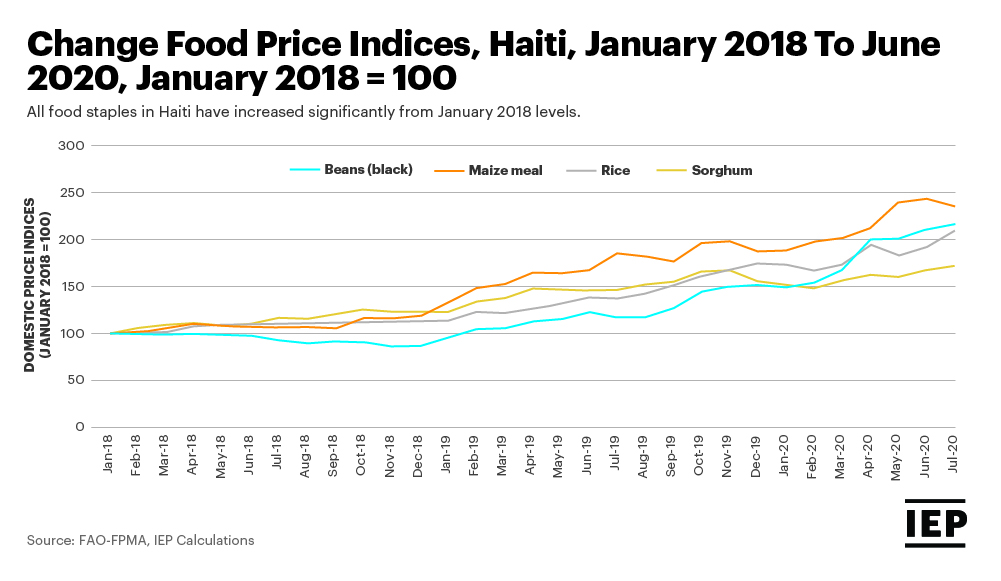Globally, as country lockdowns have increased and the movement of people restricted, economic activity has been hindered.
The worsened economic conditions have led to an unprecedented scale back of trade, production and consumption globally. Consequently, the World Bank forecasts global GDP to contract 5.2%.
The falling gross domestic product (GDP) combined with restricted global trade in response to the COVID-19 pandemic exposes the vulnerabilities and dependence on the global food system and trade.
Consequently, the pandemic compromises food security, especially in countries reliant on food imports, such as Haiti. It is estimated that a further 132 million people face hunger in 2020 as a result of the COVID-19 pandemic and subsequent economic fallout.[1] Many of these people will be living in already poor, fragile and food-insecure countries.
Food security is achieved when at all times, people have physical, social, and economic access to sufficient, safe, and nutritious food that meets their basic food preferences and dietary needs for an active and healthy life. Currently, more than two billion people globally face uncertainty in the access to a sufficient quantity of food necessary for a healthy life, and since 2014, the global number of food-insecure people has increased by 300 million people.
Haiti is just one example of how economic contractions, reduced imports and rising prices of food can negatively impact food security and nutrition. Food prices in Haiti are up to 77% higher than the rest of Central America and the Caribbean.
Furthermore, Haiti is heavily dependent on food imports which account for more than 50 per cent of available food — a consequence of poor agricultural output compounded by severe storms, flooding, landslides and drought.
Haiti clearly demonstrates that when poverty is high, even small shocks can substantially increase food insecurity. The figure below displays the change in Haiti’s food prices from January 2018 levels. The price of beans, maize and rice in Haiti have all more than doubled.

Not only do natural disasters contribute to Haiti’s food insecurity, but Haiti is also vulnerable to economic instabilities such as inflation and international price volatility which weakens the volume of food imports.[2]
Haiti is also weak in its Positive Peace measures, especially corruption and measures of government effectiveness. Due to Haiti’s dependence on food imports, minor deteriorations in economic conditions can have much larger effects on Haiti’s level of nutrition and food security.
Already, Haiti is at risk of a humanitarian crisis with 49 per cent of the country undernourished. This is significantly higher than the regional average of 32 per cent.
What makes COVID-19 different from other crises that have occurred in Haiti, such as the 2010 earthquake, is the difficulty faced by aid agencies in travelling to Haiti to lend support.
With much of the population struggling to survive day to day, increased assistance such as food is required to get Haiti through the COVID-19 crisis. Although Haiti has a relatively low number of COVID-19 cases,
Haiti only has an estimated 124 intensive care beds and 64 ventilators for a population of more than 11 million.
If the number of cases is to increase rapidly as it has done in some parts of the world, Haiti is ill-equipped to cope with the shock. Furthermore, the widespread poverty in Haiti does not allow for the country to enforce a complete shutdown to control a COVID-19 outbreak.
In the absence of government and international support, doing so would exacerbate poverty and food insecurity. Haiti desperately needs international support to combat both COVID-19 and the consequential fallout ,without, thousands more could fall into a state of undernutrition.
You made also be interested in “How Climate Change in Bangladesh is a Threat to Positive Peace”
Or “The Fight Against Large-Scale Deforestation”
Or “Brazil Fires Spark International Outcry”
[1] The report ‘State of Food Security and Nutrition in the World’
[2] Haiti | World Food Programme